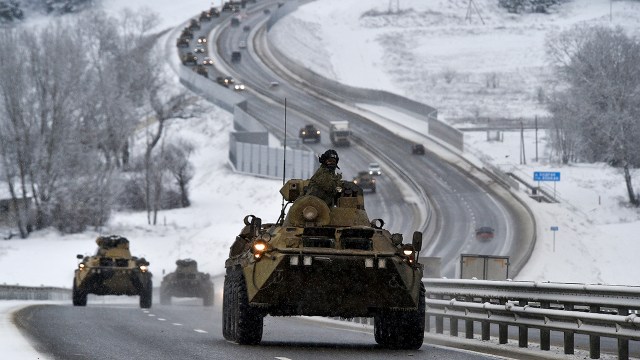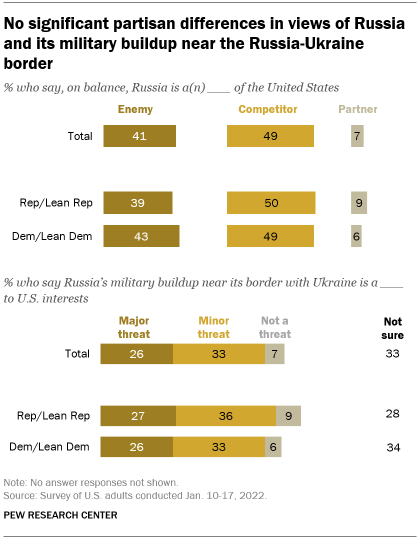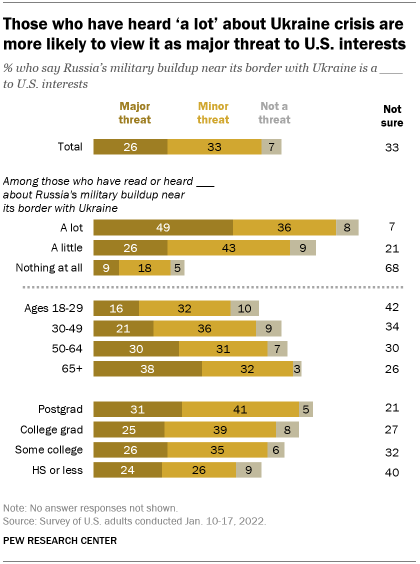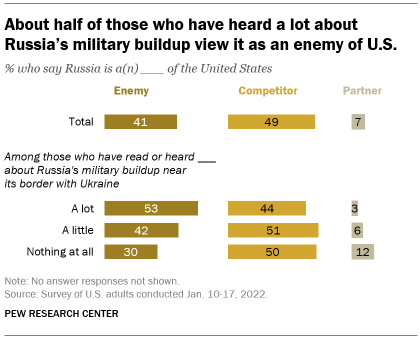
Amid tensions between the United States and Russia over a possible military invasion of Ukraine, Republicans and Democrats are largely in agreement about the threats posed by Russia, according to a new survey by Pew Research Center. The survey was conducted Jan. 10-17, prior to the U.S. putting troops on higher alert and NATO announcing that member countries would be sending military support to the region.

Overall, 49% of U.S. adults consider Russia a competitor of the U.S., while 41% say it is an enemy. Only 7% consider Russia a partner of the U.S.
Republicans and Democrats have similar views of Russia’s relationship to the U.S.: Half of Republicans and Republican-leaning independents regard Russia as a competitor to the U.S., while 39% say it is an enemy. Among Democrats and Democratic leaners, 49% view Russia as a competitor, while 43% see it as an enemy. Small shares in both parties (9% of Republicans, 6% of Democrats) say Russia is a partner of the U.S.
Pew Research Center conducted this study to understand the public’s views on Russia and the escalating tension along the Russia-Ukraine border. The study was conducted prior to NATO announcing that member countries would be sending military support to the region. For this analysis, we surveyed 5,128 U.S. adults in January 2022. Everyone who took part in this survey is a member of the Center’s American Trends Panel (ATP), an online survey panel that is recruited through national, random sampling of residential addresses. This way nearly all U.S. adults have a chance of selection. The survey is weighted to be representative of the U.S. adult population by gender, race, ethnicity, partisan affiliation, education and other categories. Read more about the ATP’s methodology.
Here are the questions used for this report, along with responses, and its methodology.
The survey also finds that about a quarter of Americans (26%) consider the Russian military buildup near Ukraine to be a major threat to U.S. interests, while 33% say it is a minor threat to U.S. interests. Another 7% say it is no threat at all. A relatively large share (33%) say they are not sure how Russian actions toward Ukraine affect U.S. interests.
Views of Russia’s military buildup near Ukraine also do not differ much by partisan affiliation. Similar shares of Republicans and Democrats consider it a major threat (27% vs. 26%) or minor threat (36% vs. 33%) to U.S. interests. Democrats (34%) are slightly more likely than Republicans (28%) to say they are unsure how Russia’s military buildup will affect U.S. interests.
Public attention to the Russia-Ukraine tensions has, thus far, been fairly limited. In the mid-January survey, 23% say they have heard a lot about Russia’s military buildup, while 45% have heard a little and nearly a third (32%) say they have heard nothing at all.

Nearly half (49%) of those who have heard a lot about the border tensions say Russia’s military buildup is a major threat to U.S. interests, compared with 26% of those who have heard a little and just 9% who have heard nothing.
Young adults and those who do not have a college degree are less likely to have heard a lot about the crisis – and are more likely to say they are not sure if Russia’s military buildup is a threat to U.S. interests.
Americans who have heard at least a little about Russia’s increased military presence along its border with Ukraine also are more likely to consider Russia an enemy of the U.S.

About half of American adults who have heard a lot about Russia’s military buildup along the Ukrainian border consider Russia an enemy of the U.S. (53%), compared with smaller shares of those who have heard a little (42%) or nothing at all (30%) about Russia’s actions.
Note: Here are the questions used for this report, along with responses, and its methodology.
